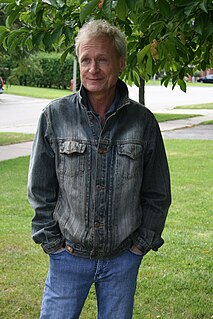
Herbert Marshall McLuhan was a Canadian philosopher whose work is among the cornerstones of the study of media theory. Born in Edmonton, Alberta, and raised in Winnipeg, Manitoba, McLuhan studied at the University of Manitoba and the University of Cambridge. He began his teaching career as a professor of English at several universities in the United States and Canada before moving to the University of Toronto in 1946, where he remained for the rest of his life.
Media studies is a discipline and field of study that deals with the content, history, and effects of various media; in particular, the mass media. Media Studies may draw on traditions from both the social sciences and the humanities, but mostly from its core disciplines of mass communication, communication, communication sciences, and communication studies.

Harold Adams Innis was a Canadian professor of political economy at the University of Toronto and the author of seminal works on media, communication theory, and Canadian economic history. He helped develop the staples thesis, which holds that Canada's culture, political history, and economy have been decisively influenced by the exploitation and export of a series of "staples" such as fur, fish, lumber, wheat, mined metals, and coal. The staple thesis dominated economic history in Canada from the 1930s to 1960s, and continues to be a fundamental part of the Canadian political economic tradition.
Media ecology theory is the study of media, technology, and communication and how they affect human environments. The theoretical concepts were proposed by Marshall McLuhan in 1964, while the term media ecology was first formally introduced by Neil Postman in 1968.

Eric McLuhan was a communications theorist and media ecologist, son of Marshall McLuhan.
The Faculty of Information is an undergraduate and graduate school that offers the following programs: a Bachelor of Information, a Master of Information (MI), a Master of Museum Studies (MMSt), and a PhD in information studies, as well as diploma courses. As a member of the iSchool movement, the Faculty of Information takes an interdisciplinary approach to information studies, building on its traditional strengths in library and information science, complemented by research and teaching in archives, museum studies, user experience, information systems and design, critical information studies, culture and technology, knowledge management, digital humanities, the history of books, data science and other related fields. It is located on St. George Campus, in the Claude Bissell building, at 140 St. George Street, which is attached to the John P. Robarts Research Library and the Thomas Fisher Rare Book Library.

Understanding Media: The Extensions of Man is a 1964 book by Marshall McLuhan, in which the author proposes that the media, not the content that they carry, should be the focus of study. He suggests that the medium affects the society in which it plays a role mainly by the characteristics of the medium rather than the content. The book is considered a pioneering study in media theory.

Derrick de Kerckhove is the author of The Skin of Culture and Connected Intelligence and Professor in the Department of French at the University of Toronto, in Toronto, Ontario, Canada. He was the Director of the McLuhan Program in Culture and Technology from 1983 until 2008.

Walter Jackson Ong was an American Jesuit priest, professor of English literature, cultural and religious historian, and philosopher. His major interest was in exploring how the transition from orality to literacy influenced culture and changed human consciousness. In 1978 he served as elected president of the Modern Language Association.
Samuel Clarke "Sandy" Pearlman was an American music producer, artist manager, music journalist and critic, professor, poet, songwriter, and record company executive. He was best known for founding, writing for, producing, or co-producing many LPs by Blue Öyster Cult, as well as producing notable albums by The Clash, The Dictators, Pavlov's Dog, and Dream Syndicate; he was also the founding Vice President of eMusic.com. He was the Schulich Distinguished Professor Chair at the Schulich School of Music at McGill University in Montreal, and from August 2014 held a Marshall McLuhan Centenary Fellowship at the Coach House Institute (CHI) of the University of Toronto Faculty of Information as part of the CHI's McLuhan Program in Culture and Technology.
Robert K. Logan, originally trained as a physicist, is a media ecologist.

Bruce William Powe, commonly known as B. W. Powe, is a Canadian poet, novelist, essayist, philosopher, and teacher.
Edmund "Ted" Snow Carpenter was an American anthropologist best known for his work on tribal art and visual media.
Communication Aesthetics was devised by Mario Costa and Fred Forest at Mercato San Severino in Italy in 1983. It is a theory of aesthetics calling for artistic practise engaging with and working through the developments, evolutions and paradigms of late twentieth century communications technologies. Observing the emerging supremacy of networks over subjects, it called for an artistic approach that was both adapted to, and invested in this changing techno-social arena.
This is a bibliography of Marshall McLuhan's works.

Francesco Monico is a teacher, researcher, artist in Italy.
Harley Parker was a Canadian artist, designer, curator, professor and scholar - a frequent collaborator with fellow Canadian and communications theorist Marshall McLuhan.
The Toronto School is a school of thought in communication theory and literary criticism, the principles of which were developed chiefly by scholars at the University of Toronto. It is characterized by exploration of Ancient Greek literature and the theoretical view that communication systems create psychological and social states. The school originated from the works of Eric A. Havelock and Harold Innis in the 1930s, and grew to prominence with the contributions of Edmund Snow Carpenter, Northrop Frye and Marshall McLuhan.

Kim (Keimpe) Henry Veltman was a Dutch/Canadian historian of science and art, director of the Virtual Maastricht McLuhan Institute (VMMI), consultant and author, known for his contributions in the fields of "linear perspective and the visual dimensions of science and art," new media, culture and society.
Janine Marchessault is a professor of Cinema and Media Studies and Canada Research Chair (2003-2013) at York University in Toronto, Canada. Her main fields of research are Ecologies of Media and Mediation, (sub)urban cultures, the works of Marshall McLuhan, contemporary art exhibitions, Expo 67, artists' cultures, new media technologies, media archives, city and its sustainability issues. She is also a Trudeau Fellow.








